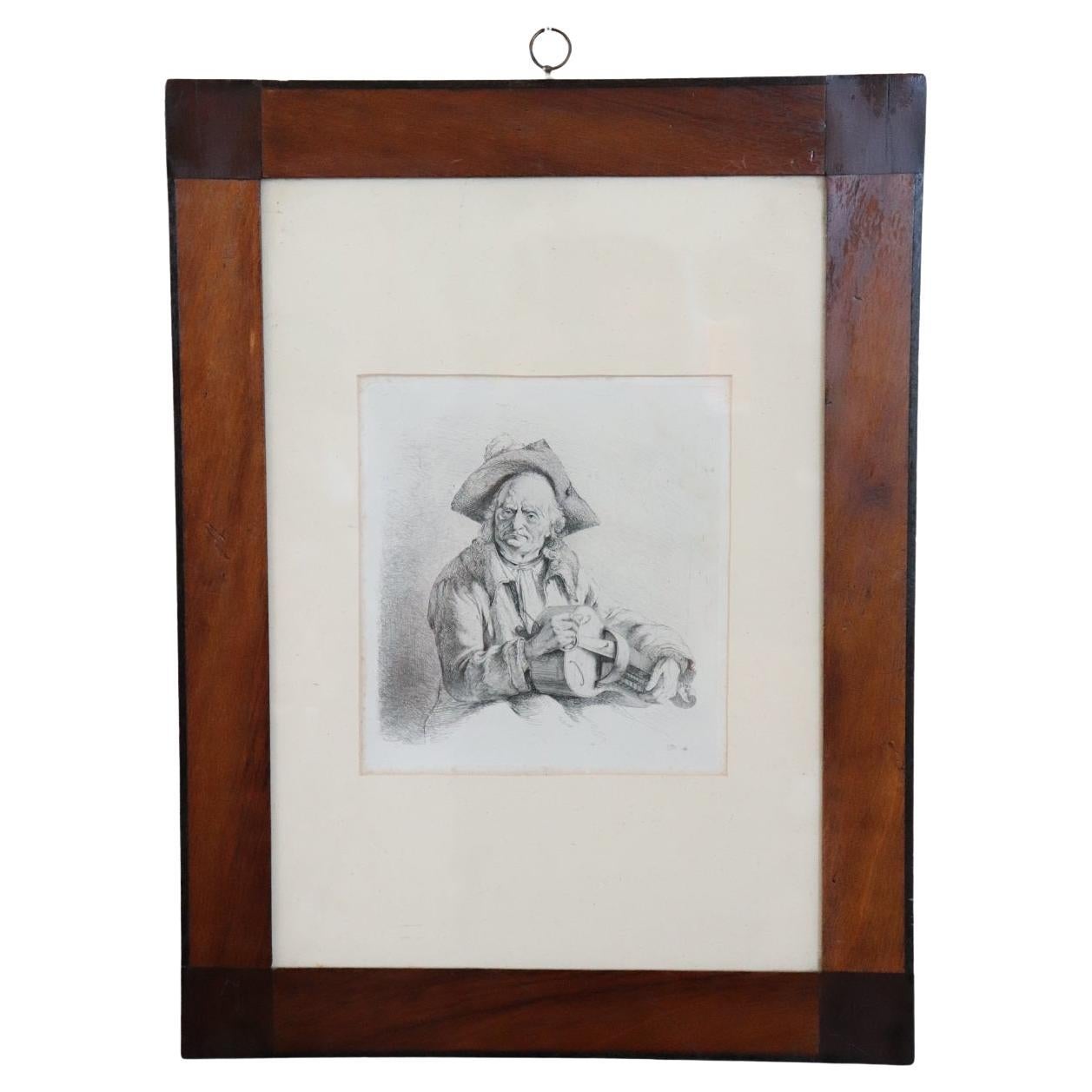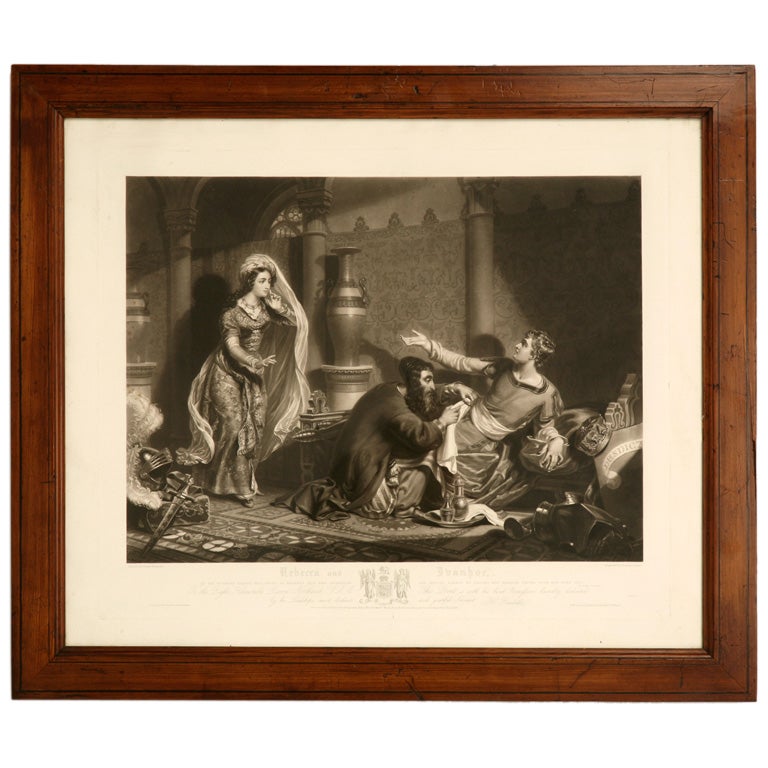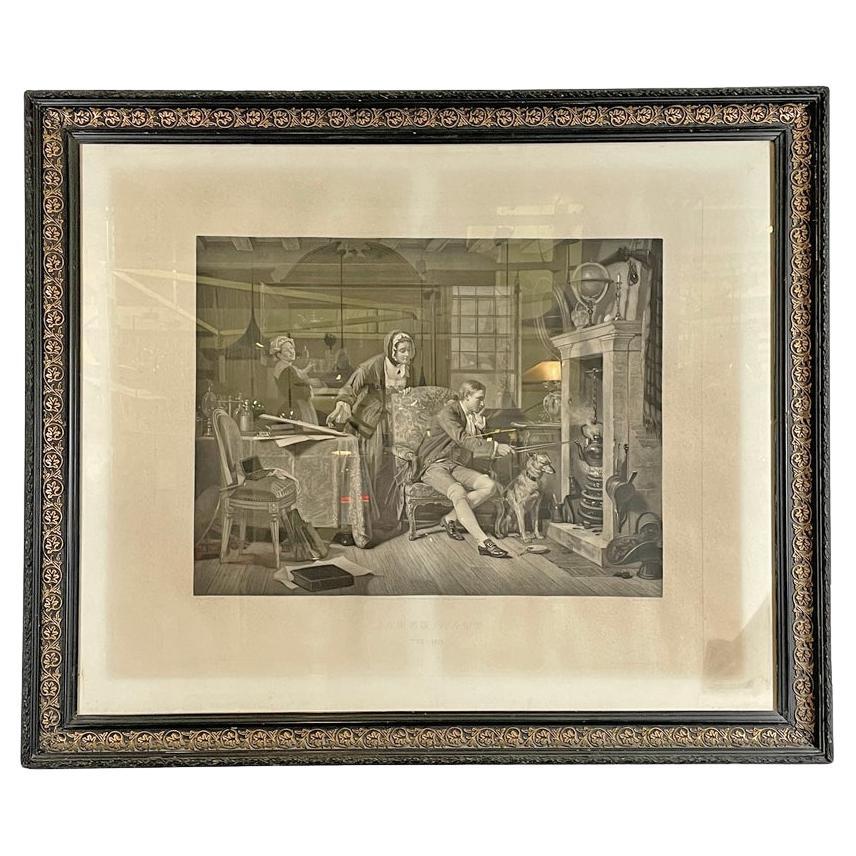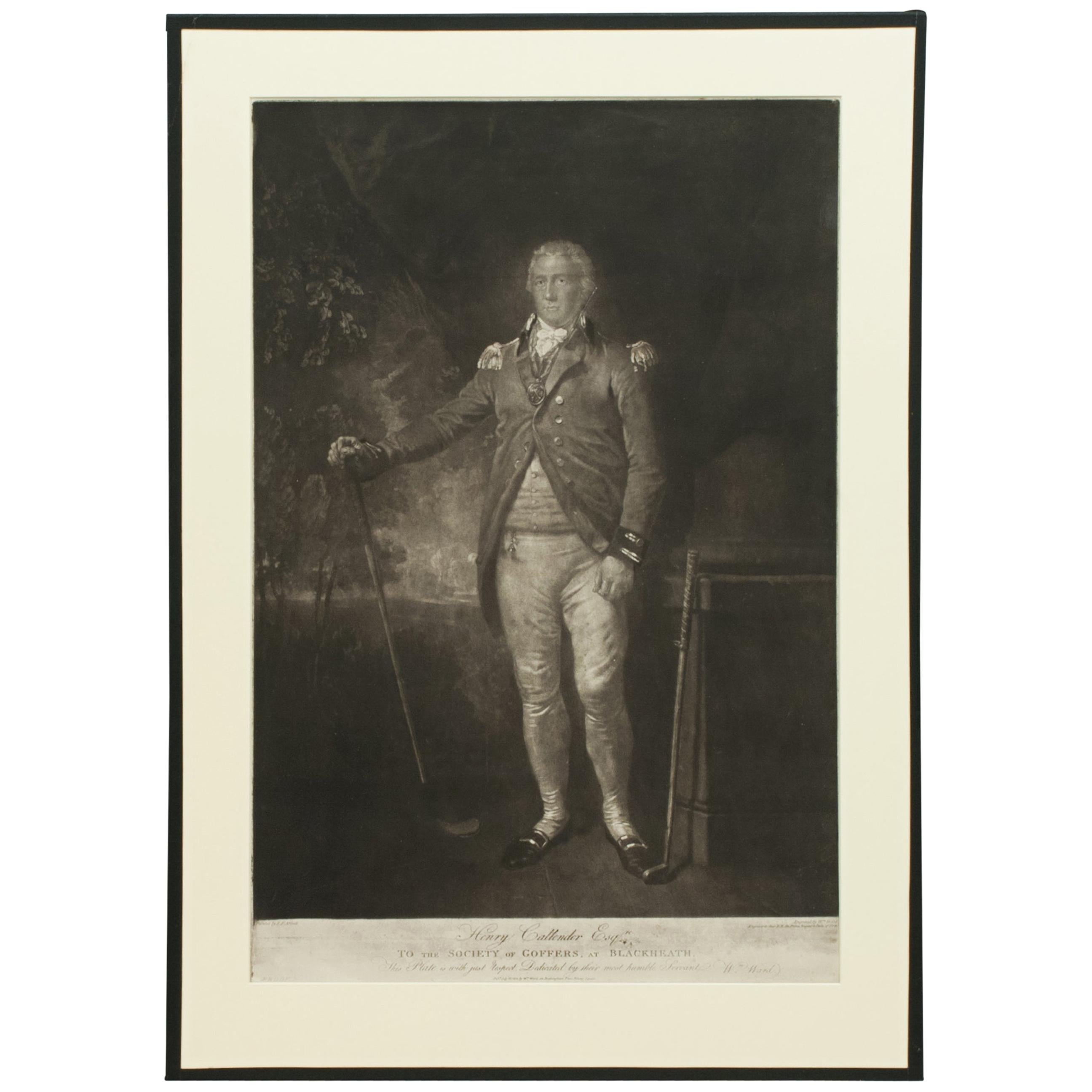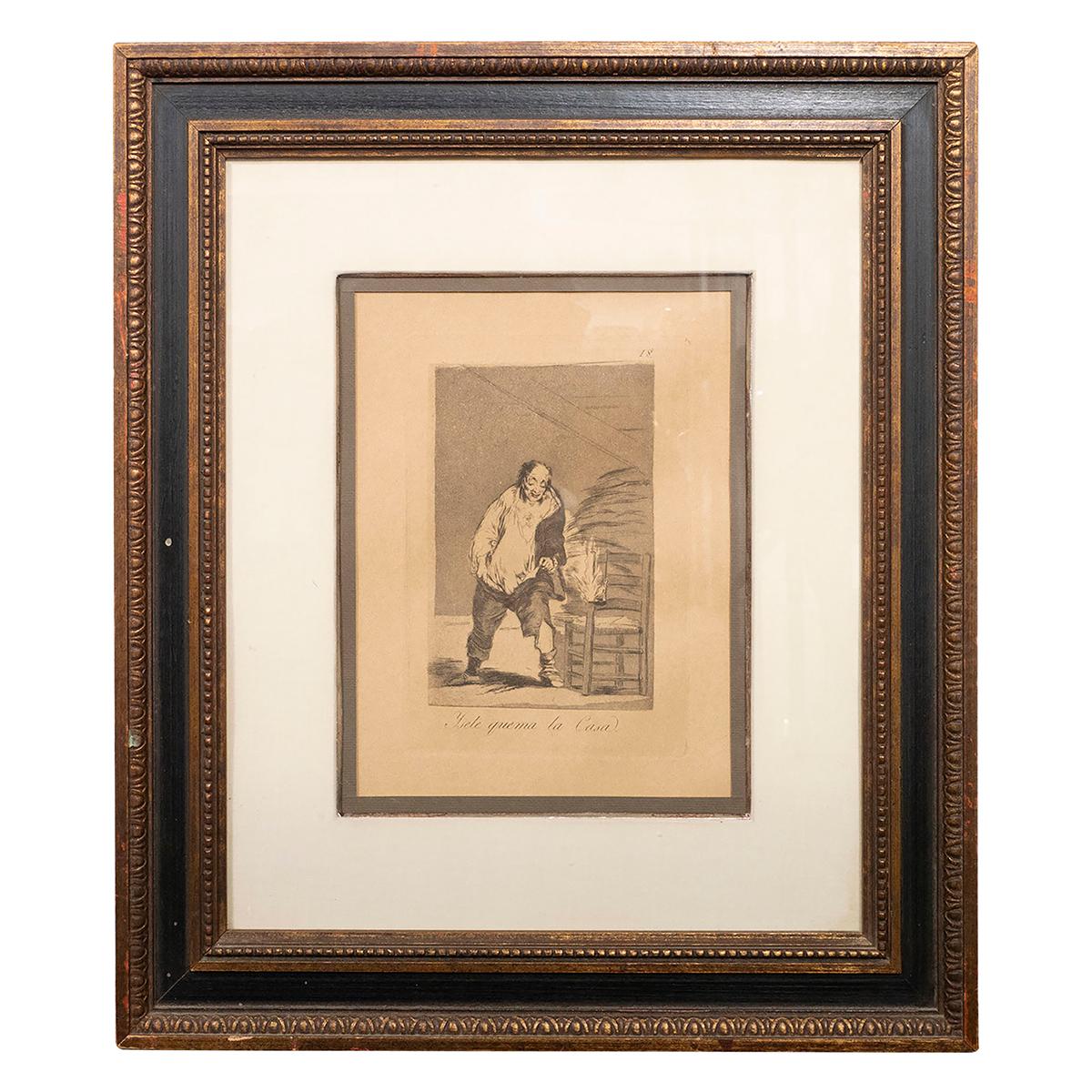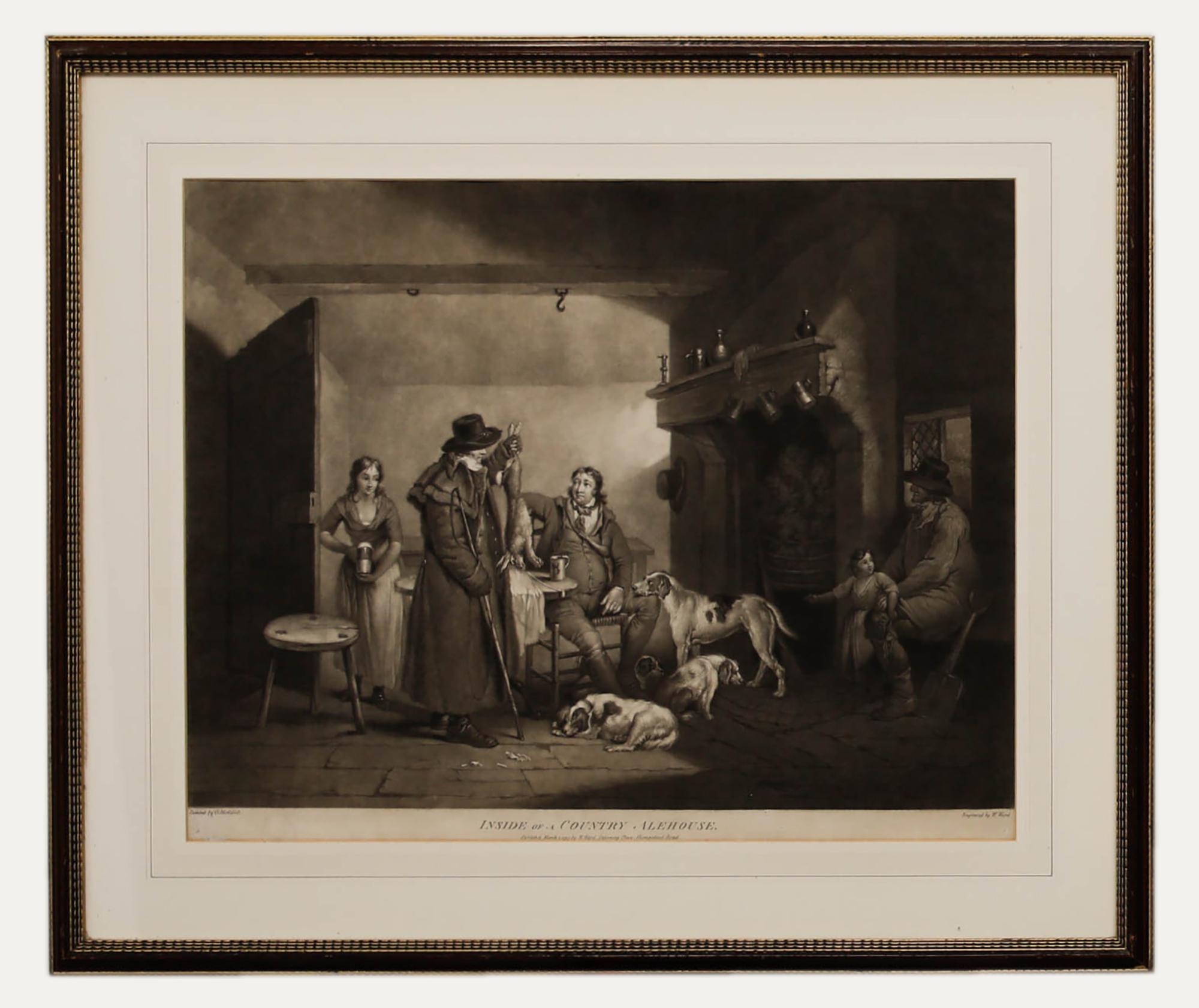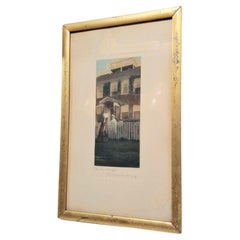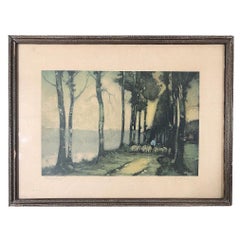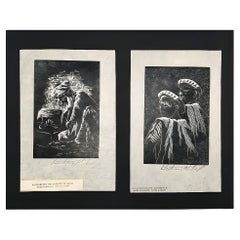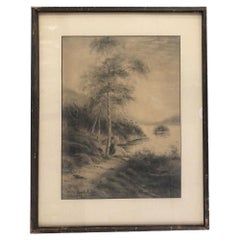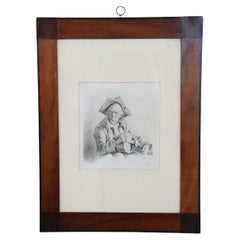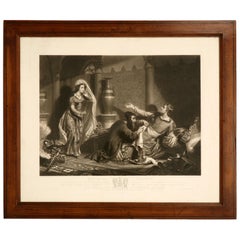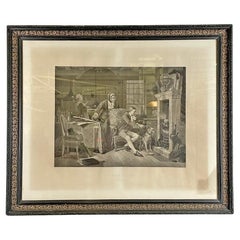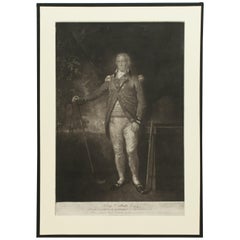Items Similar to 1828 Egnlish Massa Out “Sambo Werry Dry” Mezzotint Etching By Henry Pidding
Want more images or videos?
Request additional images or videos from the seller
1 of 6
1828 Egnlish Massa Out “Sambo Werry Dry” Mezzotint Etching By Henry Pidding
$2,295
£1,739.48
€2,013.62
CA$3,239.94
A$3,607.94
CHF 1,883.79
MX$43,716.82
NOK 23,756.53
SEK 22,416.15
DKK 15,031.41
About the Item
Late Georgian period Mezzotint Etching print By English Artist Henry Pidding titled Massa Out “Sambo Werry Dry”. The print features a young man seated by a table on which are keys marked 'cellar', pouring wine from a bottle into a glass, and addressing a dog that is watching him.
The letter with title and dedication by the artist to the owner of the painting, Lord Charles Townshend, and with "Painted and Engraved by Henry Pidding" and "London Published for the artist Decr. 8th 1828 by Pidding & Co. No.1 Cornhill"
A fine mezzotint on woven paper by Pidding (1797 – 1864) depicts a black man sitting at a table near the window, pouring out a glass for himself with a dog sitting at his feet. Taken from the original picture in the collection of Charles Townsend. Very attractive and decorative. Exceedingly rare, we have been only able to trace one.
The print comes in its original Hardwood frame.
Measurements
Frame: Height: 23", Width: 18", Depth: 1"
Print: Height: 15.7", Width: 11.1"
England, 1828
About the Seller
4.7
Platinum Seller
Premium sellers with a 4.7+ rating and 24-hour response times
Established in 1969
1stDibs seller since 2012
1,361 sales on 1stDibs
Typical response time: 1 hour
- ShippingRetrieving quote...Shipping from: Van Nuys, CA
- Return Policy
Authenticity Guarantee
In the unlikely event there’s an issue with an item’s authenticity, contact us within 1 year for a full refund. DetailsMoney-Back Guarantee
If your item is not as described, is damaged in transit, or does not arrive, contact us within 7 days for a full refund. Details24-Hour Cancellation
You have a 24-hour grace period in which to reconsider your purchase, with no questions asked.Vetted Professional Sellers
Our world-class sellers must adhere to strict standards for service and quality, maintaining the integrity of our listings.Price-Match Guarantee
If you find that a seller listed the same item for a lower price elsewhere, we’ll match it.Trusted Global Delivery
Our best-in-class carrier network provides specialized shipping options worldwide, including custom delivery.More From This Seller
View AllWallace Nutting Signed "The Last Word" Hand Colored Photo Lithograph
By Wallace Nutting
Located in Van Nuys, CA
A rare 1910 Hand Colored Photographic Lithograph artwork print Titled "The Last Word" signed by an American photographer Wallace Nutting in pencil on the mat board. This print is in ...
Category
Vintage 1910s Prints
Materials
Paper
Copper Engraving of Shepherd by Trees Signed by Artist
Located in Van Nuys, CA
This copper engraving print depicts a serene beaten path next to a river. A winding path, bordered by lush trees, meanders along the river's edge. In the foreground, a flock of sheep...
Category
Vintage 1930s Prints
Materials
Paper
Pair of Wood Block Engraving Prints by Bertram Reibel signed in Frame
Located in Van Nuys, CA
Pair of wood engraving block portraits featuring " Santiago Atitlan" & " A Scribe on the Streets of Kabul" signed by Bertram Reibel framed together in an acrylic shadow box.
The fir...
Category
Vintage 1970s American Modern Prints
Materials
Acrylic, Paper
Framed Women by Lake Landscape Charcoal on Paper by Irene Radcliffe, 1971
Located in Van Nuys, CA
Original charcoal on paper Landscape signed and dated by artist Irene Radcliffe in black wood frame. This beautiful charcoal landscape by artist Irene Radcliffe depicts a peaceful sc...
Category
Vintage 1970s American Neoclassical Drawings
Materials
Glass, Wood, Paper
Drawing Hasidic Dancers Judaica Portrait Lithograph by Melchi Hundler 140/150
Located in Van Nuys, CA
Limited Edition Lithograph by Melchi Hundler signed with an edition number of 140/150, featuring a charcoal Drawing of Hasidic Dancers (man and wife). This evocative limited edition ...
Category
Vintage 1980s American American Classical Prints
Materials
Glass, Wood, Paper
Louis Icart Colored Etching "Seville" in original Frame
Located in Van Nuys, CA
Louis Icart "Seville" Colored artwork Etching in original frame circa 1982
Using the drypoint process, Icart could sketch an idea onto a blank copper or zinc plate. For this, he use...
Category
Vintage 1930s Prints
Materials
Paper
You May Also Like
18th Century Antique Etching Engraving by Jean-Jacques de Boissieu
By Jean-Jacques de Boissieu
Located in Casale Monferrato, IT
Beautiful 18th century antique etching engraving with in walnut briar frame. Was etching by Jean-Jacques de Boissieu (1736 - 1810) was an fr...
Category
Antique 1770s French Prints
Materials
Paper
c.1830 Exquisite Antique English Etching Artist Proof
Located in Chicago, IL
English etching artist proof. The bottom reads as follows:
Printed by Henry Fradelle and engraved by Thomas Lupton.
Rebecca and Ivanhoe
AS THE WOUNDED KNIGHT WAS ABOUT TO ADDRESS THIS FAIR APPARITION SHE IMPOSED SILENCE BY PLACING HER SLENDER FINGER UPON HER RUBY LIPS...
Category
Antique 19th Century English Romantic Prints
Materials
Paper
English antique etching print with black wood and golden metal frame, 1863
Located in MIlano, IT
English antique etching print with black wood and golden metal frame, 1863
Etching with frame. The print depicts the scientist James Watt in his...
Category
Antique 1860s English Prints
Materials
Metal
Antique Golf Engraving, Henry Callender ESQ, Golf Mezzotint
Located in Oxfordshire, GB
Golf mezzotint of 'Henry Callender Esq' (Captain of the society of Golfers at Blackheath) after Lemuel Francis Abbott (1760-1803).
Henry Callend...
Category
Antique 1810s British Sporting Art Sports Equipment and Memorabilia
Materials
Paper
Old Master Etching and Aquatint
By Francisco De Goya
Located in Tarrytown, NY
Plate #18 from Francisco de Goya's "Los Caprichos" series titled "Ysele Quema La Casa." Printed on wove paper. Double matted and contained under glass in an ebonized and parcel gilt ...
Category
Antique 19th Century Spanish Romantic Prints
Materials
Giltwood, Paper
Ward after Morland - 1797 Mezzotint, Inside of a Country Alehouse
Located in Corsham, GB
W. Ward after George Morland. Title, artists and date inscribed in print. Presented in a part gilt frame. On paper.
Category
Early 18th Century Figurative Prints
Materials
Mezzotint
$277 Sale Price
20% Off
More Ways To Browse
Antique Bottle Glass Windows
Georgian Window Seat
Spin Display
Tapestry Dog
Vintage And Antique Wall Decor And Decorations
Vintage Silver Lighters
17th Century Plaque
1970 Outdoor Chairs
80s Cabinet
84 Dresser
African Ebony Wood
Anglo Indian Elephant
Animal Jugs
Antique Mahogany Corner Shelf
Antique Victorian Mantel Clocks
Art Deco Revere
Art Deco Tall Storage Cabinet
Austrian Rococo Furniture
